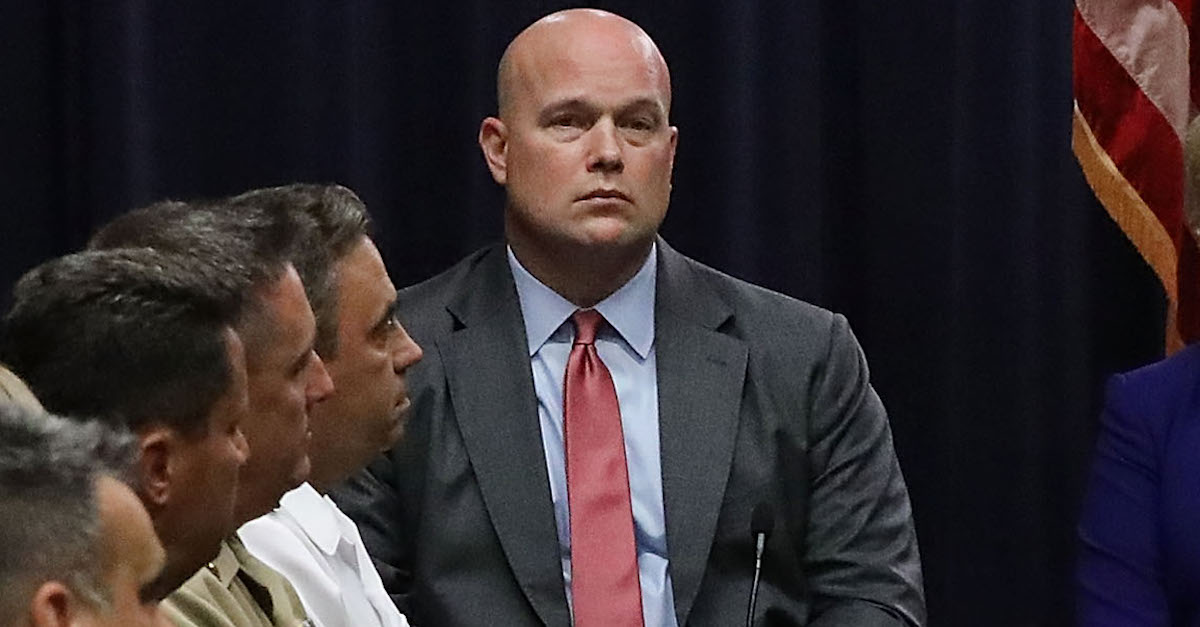
A war is brewing on social media over whether America’s newly-named acting attorney general should — or must — recuse himself from overseeing the investigation into possible Russian interference with the 2016 election. Deputy Attorney General Rod Rosenstein was in charge of that probe because former Attorney General Jeff Sessions recused himself from involvement. With Sessions gone, the conflict departs with him. But Attorney General Matthew Whitaker has no such legal or ethical obligation to step aside, according to a leading legal ethics expert.
Elihu Root Professor of Law at NYU Stephen Gillers told Law&Crime that objections to Whitaker are “compelling,” but there is ultimately “no legal ethics issue here.” Prof. Gillers is one of the most cited legal ethics scholars.
“Objections to Whitaker because he seems already to have made up his mind on the Mueller investigation, even before he can know all that Mueller knows, are compelling,” Gillers said. “But there is no legal ethics issue here. As a policy maker, his job is to have a point of view on the issues, just as Rosenstein has.”
Many, whether Democratic lawmakers or blue-check Twitter personalities, have responded to Sessions’ ouster by immediately calling for Whitaker to recuse himself, given his past comments on special counsel Robert Mueller‘s investigation.
There are endless Twitter posts just like these. Whitaker’s August 2017 column for CNN, in which he wondered if the Mueller Probe has gone too far, has received a lot of attention. So have his comments about Trump possibly aiming to pressure Deputy Attorney General Rod Rosenstein into “cut[ting] the budget of Bob Mueller.” Whitaker’s tweets have raised eyebrows.
https://twitter.com/yashar/status/1060268980722577408
Nor have Whitaker’s past remarks about the Hillary Clinton email investigation escaped attention. Fired FBI Director James Comey famously said that “no reasonable prosecutor” would charge Clinton. Whitaker disagreed: “As a former U.S. attorney, I believed there was a strong case to bring against her and she should be extremely grateful that has not happened.”
Then there was this:
You may recall that Jeff Sessions recused himself by citing Title 28, Chapter I, Section 45.2 of the Code of Federal Regulation (CFR) — “Disqualification arising from personal or political relationship.”
Sessions stated that he had to recuse himself from the heading up the Russia probe because he served as a campaign advisor for the Trump campaign.
“That regulation states, in effect, that department employees should not participate in investigations of a campaign if they have served as a campaign advisor,” Sessions said at the time.
There does not appear to be any slam dunk conflict for Whitaker, even if you read through the entirety of the relevant regulation:
[N]o employee shall participate in a criminal investigation or prosecution if he has a personal or political relationship with:
(1) Any person or organization substantially involved in the conduct that is the subject of the investigation or prosecution; or
(2) Any person or organization which he knows has a specific and substantial interest that would be directly affected by the outcome of the investigation or prosecution.
…
For the purposes of this section:
(1)Political relationship means a close identification with an elected official, a candidate (whether or not successful) for elective, public office, a political party, or a campaign organization, arising from service as a principal adviser thereto or a principal official thereof; and
(2)Personal relationship means a close and substantial connection of the type normally viewed as likely to induce partiality. An employee is presumed to have a personal relationship with his father, mother, brother, sister, child and spouse. Whether relationships (including friendships) of an employee to other persons or organizations are “personal” must be judged on an individual basis with due regard given to the subjective opinion of the employee.
It’s certainly worth mentioning, however, that Whitaker did serve as a campaign chairman for Sam Clovis back in 2014. Clovis was running for Iowa state treasurer. Why does this matter? Clovis was a Trump campaign advisor and he’s testified before a Mueller grand jury. As CNN noted:
A personal connection to a Mueller witness is unlikely to sway Whitaker or the White House when it comes to recusal, as Deputy Attorney General Rod Rosenstein supervised the probe despite being a witness himself.
The analysis of the regulation above remains important. Clovis and Whitaker were described as “great friends” during their Iowa campaign, and a campaign chairman is a principal advisor. A compelling case could be made that Clovis fits the definitions of both personal and political relationships as they relate to Whitaker, but there is still the question of whether Clovis is “substantially involved in the conduct that is the subject of the investigation or prosecution,” namely the conduct being investigated by Robert Mueller.
Clovis was reportedly “an unnamed ‘campaign supervisor’ in the indictment of former Trump campaign aide George Papadopoulos.” Papadopoulos pleaded guilty to making false statements to the FBI. Papadopoulos has claimed ever since, in one form or another, that he was “entrapped.”
That aside, it does not appear that Whitaker, merely by commenting on the Mueller Probe or opining on other things, has clearly established a personal or political relationship of such magnitude (as defined here) that he would be required to recuse himself.
As Prof. Gillers states in the opening, it was Whitaker’s job to have a point of view on the issues. After all, he was Jeff Sessions’ chief of staff. Before that he was a federal prosecutor.
Asking the question of whether Mueller was operating out of the scope of his Russia Probe mandate is not a conflict.
ABA Model Rules 1.7-1.11, which cover conflicts of interest, do not indicate that there is necessarily an ethical or legal obligation for Whitaker to step aside, either. The same is true of the Department of Justice’s Ethics outline.
Editor’s note: this story was updated after publication in light of Whitaker’s known relationship with Mueller grand jury witness Sam Clovis.
[Image via Chip Somodevilla/Getty Images]